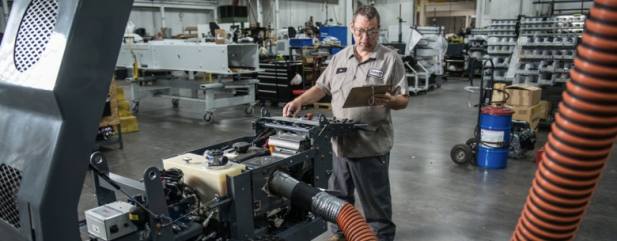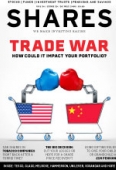Archived article
Please note that tax, investment, pension and ISA rules can change and the information and any views contained in this article may now be inaccurate.
Lowland fund manager says portfolio diversification is essential in the current market

A leading fund manager has warned of the importance of portfolio diversification in the current economic climate. James Henderson, who co-manages Lowland Investment Company (LWI), says the UK economy is very ‘patchy’ at present and diversification is needed to get around pockets of weakness.
Having multiple holdings provides a cushion should one or a handful experience difficult times. And such an approach has certainly come to the aid of Henderson who has suffered the collapse of two holdings in Lowland this year: construction group Carillion and drinks distributor Conviviality.
Most investors are likely to experience the odd setback in their career and they should learn from their mistakes. Indeed, Lowland says in its half year results that Conviviality’s situation was a ‘painful reminder that distribution companies need good financial disciplines and that their quality of earnings can be low’.
Conviviality may have been the biggest detractor to the portfolio in the six months to 31 March 2018, but it is only a minor blot on Lowland’s performance. The investment trust’s longer-term track record is very good with 13.28% annualised returns over the past decade versus 8.41% from its benchmark, according to Morningstar.
PORTFOLIO STRUCTURE
Lowland typically holds 120 stocks in its portfolio and it seeks to generate capital growth and income. Despite historically having a bias towards small and medium-sized companies, the current portfolio is dominated by larger companies in terms of its biggest holdings.
‘Some of the bigger companies are attractive to me in terms of income and straight valuation compared to medium-sized companies. I’m also finding value at the bottom end of the market and Lowland’s AIM weighting has gone up,’ says Henderson.
Lowland sells itself as having holdings you wouldn’t find in many other investment trusts of its kind (i.e. UK equity all-cap), either because they are small or less well known. So why then does it invest in Royal Dutch Shell (RDSB), HSBC (HSBA) and Vodafone (VOD) which are classic staples of UK equity income funds?
The fund manager says they provide a slight element of ballast but really it is because they are good examples of companies which have previously fallen out of favour with investors over the years.
Lowland has a contrarian investment approach and likes to buy stocks when they are unloved.
For example, Shell experienced significant pain when the oil price started to dive four years ago. ‘Management had a shock and it was clear the business structure had become too bloated and the cost line out of control. They made changes and it is now a better company.’
SMALL ALONGSIDE LARGE
Where Lowland is clearly different from its peer group is the blend of large and small businesses. It is quite interesting to see a fund happy to hold a £220m cap business like construction equipment provider Somero Enterprises (SOM:AIM) alongside a £35bn business such as media group RELX (REL).
Henderson says the smaller end of the market is where he can really have an edge over other investors. ‘You add value by paying attention to things other people aren’t following, such as stocks where there are very few analysts covering it. You are more likely to notice if it is underpriced.’
One of his current favourites is Randall & Quilter (RQIH:AIM) which manages run-off insurance assets. He also likes drug company 4D Pharma (DDDD:AIM) which he calls a well-funded company with drugs being tested and which has an attractive tie-up with pharma giant Merck.
‘Sometimes stocks get overhyped and people get bored of them so the share price drifts. That’s happened with 4D Pharma yet real progress is being made with its portfolio.’
TRADING IN AND OUT
The investment trust typically holds stocks for five to seven years and isn’t afraid to trade in and out of stocks depending on variations in valuation and movements with the business cycle.
For example, paving stone specialist Marshalls (MSLH) has been in its portfolio numerous times since the 1990s. Firms in its sector do well when the economy is booming, the housing market is strong, and the public sector is spending money. But building materials stocks suddenly go out of favour when the economy turns, interest rates go up and projects are put on hold. Eventually the cycle will start again.
‘We buy when these companies are out of favour. Marshalls is a wonderful company and when people become more confident about its prospects, its rating goes up. You then need to start reducing your holding before the cycle turns.’
Henderson says he is always moving too early, albeit he says his style requires selling into upswings so as to recycle cash into more out-of-favour shares. Last year he sold out of chemicals group Scapa (SCPA:AIM) when the rating became high. He’s been top slicing Herald Investment Trust (HRI) which he calls a ‘good holding’ but where the rating has shot up amid tech stocks trading on higher multiples.
WAITING FOR THE RIGHT ENTRY POINT
Knowing when to pounce on unloved shares can be very tricky as there is a risk of ‘catching a falling knife’, namely buying when a company’s shares are in freefall and still have further to decline in value.
The fund manager says UK domestic earners are currently having a difficult time ‘which is good for me’. However, he says it is still too early in the cycle to start buying depressed UK retail stocks.
‘Wages are not keeping pace with inflation and there are clear Brexit uncertainties. That leads to lower valuations. But there is long-term structural growth for online retailers to consider. I’m looking at Dunelm (DNLM) at the moment but I won’t do anything about it yet. I will wait.’
This kind of patience and discipline is to be applauded as many investors get caught up in the rush when they find an idea, acting first and thinking later. (DC)
Important information:
These articles are provided by Shares magazine which is published by AJ Bell Media, a part of AJ Bell. Shares is not written by AJ Bell.
Shares is provided for your general information and use and is not a personal recommendation to invest. It is not intended to be relied upon by you in making or not making any investment decisions. The investments referred to in these articles will not be suitable for all investors. If in doubt please seek appropriate independent financial advice.
Investors acting on the information in these articles do so at their own risk and AJ Bell Media and its staff do not accept liability for losses suffered by investors as a result of their investment decisions.
Issue contents
Aequitas
Big News
- Sosandar is a rare retail success story in 2018 with soaring shares
- Asset valuation concerns cloud Hammerson as it seeks £1.9bn disposals
- Shareholders rally to block excessive pay packages
- Can Jack’s work its magic as Tesco’s new discount chain?
- Renewed speculation that GlaxoSmithKline could spin off consumer division

 magazine
magazine









